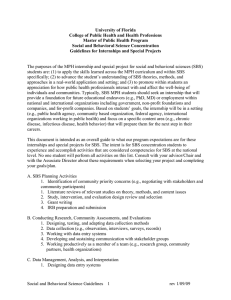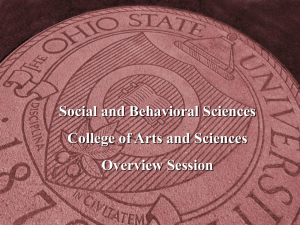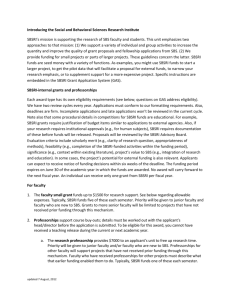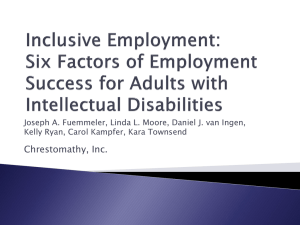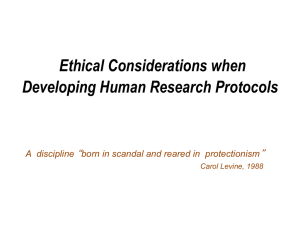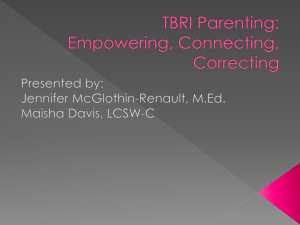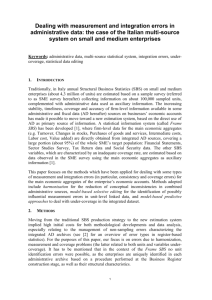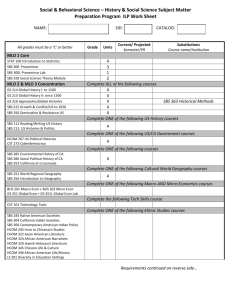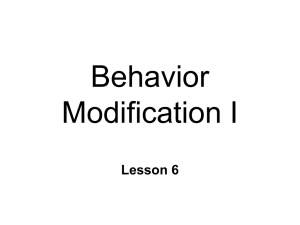Social and Behavioral Research in the Medical Setting
advertisement
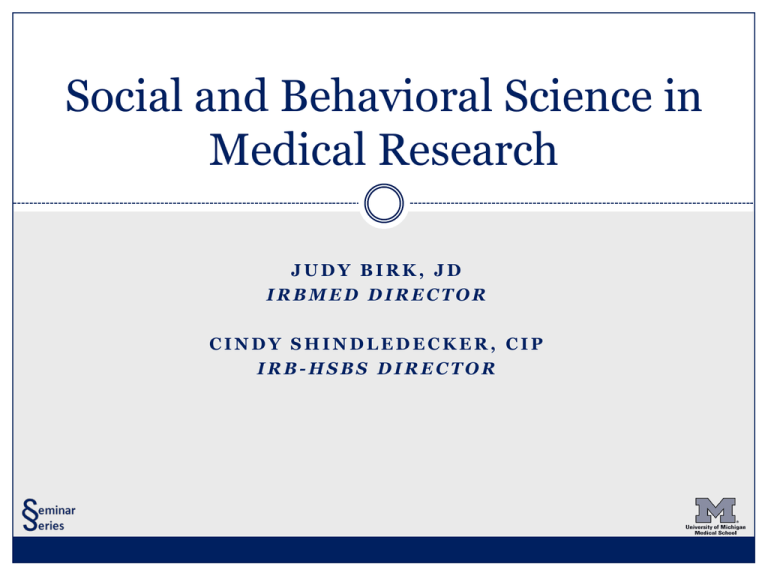
Social and Behavioral Science in Medical Research JUDY BIRK, JD IRBMED DIRECTOR CINDY SHINDLEDECKER, CIP IRB-HSBS DIRECTOR Objectives Define Social / Behavioral Science (SBS) as a JB component of medical research Examples Perceptions / challenges Data collection formats Special considerations for study teams and the IRB Social/Behavioral Science (SBS) Research What is SBS research? Study of human behavior and relationships Applies scientific logic and methods to the study of social phenomena Importance in medical research Collects information other than objective clinical/lab values Identifies barriers to Improving overall human health Research participation including recruitment, enrollment, and retention JB SBS Contributions to Medicine Human factors/decision-making Increased safety in healthcare settings for patients / providers Health policy Anti-smoking campaigns Education Cancer prevention, screening, and control Epidemiology Patterns, causes, and effects of disease conditions in defined populations JB AAMC Report Recognizing SBS Behavioral and Social Science Foundations for Future Physicians (2011) JB Over 50 percent of premature morbidity and mortality is caused by behavioral and social determinants of health such as smoking, diet, exercise, and socioeconomic status While complex and not easily remedied, each of these phenomena is amenable to behavioral and social sciences study and intervention. Behavioral and social science knowledge and skills can support health and wellness, explain disease etiology, improve adherence rates to existing treatments, and develop new interventions. AAMC Report Smoking as an example To best serve their patients, physicians need to understand why patients choose to smoke and how to facilitate behavioral change through building intrinsic motivation. Physicians with behavioral and social science knowledge also appreciate social factors, such as peer pressure and advertising, that promote smoking, and the policy interventions, such as tobacco taxes, that greatly curtail smoking rates. Moreover, prevention or treatment of nicotine addiction requires knowledge of the health care system, referral resources, adherence promotion, and effective relationships with allied addiction counselors. JB NIH: Office of Behavioral and Social Sciences Research There is a growing recognition that most major threats to the public’s health – including: and more—are complex in the sense that each one arises from an intricate mix of behavioral, economic and social factors interacting with biological factors, as well as each other, over the lifespan and across an array of settings (e.g., home, school, workplace, neighborhood, etc.). JB Cardiovascular disease Pulmonary disease Cancer Diabetes Mental health problems HIV Substance abuse Violence Emerging infectious diseases Obesity Sedentary lifestyle Poor diet Sleep disorders Academic Model: University of Michigan Medical School Center for Bioethics and Social Sciences in Medicine CBSSM is a multidisciplinary unit integrating bioethics with research, education, policy work, and public outreach in areas of: Doctor-patient communication Psychological adaptation to disability Health care rationing Social cognition Decision aids to communicate risk Informed consent Deliberative democracy JB Academic Model: Northwestern University Feinberg School of Medicine Department of Medical Social Sciences In support of clinical research and integrated biomedical and social science to improve health and healthcare delivery: Health measurement Quality of life measures Outcomes science Statistical tools JB Academic Model: King’s College of London Department of Social Science, Health and Medicine JB Ageing & Society Biomedicine, Ethics & Social Justice Biotechnology, Pharmaceuticals & Public Policy Culture, Medicine & Power Why, then, is this so challenging? Medical Research JB Social Science Research Perceptions and Challenges of SBS Research Unfamiliarity of clinicians with techniques In conflict with standard medical practices Privacy and confidentiality for subjects Sensitive information needs to be managed outside of the medical record Alterations to the informed consent process Different formats Level of disclosure Assessing and assigning subject risk Assessments may be more difficult; subjective JB Special Considerations in SBS Research Points to remember: Risks associated with SBS research are primarily psychological, financial, employability, reputational or legal Most common risk is breach of confidentiality CS Forms of SBS Data Collection Interviews (1:1 direct interaction) Focus groups (Moderated, group discussions) Surveys (Telephone, online, paper-based, mobile devices) Observation of online behavior (social networking, educational web resources) CS Interviews Benefits Allows for greater, subjective exploration of topics Opportunity for establishing a connection with the researcher Challenges Interview may deviate from the planned, IRB-approved question set Participant may disclose sensitive information not contemplated CS Focus Groups Benefits The moderated group discussion permits introduction and explorations of view points among the group Challenges Maintaining confidentiality of the discussion CS Consider use of pseudonyms, particularly when sensitive topics will be explored Consent should disclose the uncontrolled nature of the discussion and should not promise confidentiality Surveys Benefits Allows for disclosure of information in a more protective manner (surveys may be completely anonymous or coded) Data are more objectively recorded (not biased by interviewer) and easily compiled and analyzed Easy to reach a large audience Challenges Knowing your subject (especially on-line) Data security of online survey tools CS Observation of Online Behavior Benefits Web-based health interventions Facilitate the collection of survey data and observation of online user behavior Social networking tools Use of social networking tools to remind patients to take meds, report mood information, etc. Challenges Public vs. private behavior Obtaining informed consent Data security issues CS Deception and Concealment Studies: Definitions Not all information is disclosed to potential and actual participants CS Deception in human subjects research means deliberately misleading subjects about the nature of a study Concealment means deliberately withholding certain information Deception and Concealment Studies Why is this type of research necessary? CS Full disclosure of information about the nature of the study might bias the response if subjects knew the true purpose of the research Deception and Concealment Studies: IRB Considerations Increased scrutiny by the IRB Review of study design Informed consent waiver There is no other way to answer the research question Full or partial Debriefing Whenever possible, disclosure of the true purpose of the study as soon as possible after their participation is completed Allow the subject to continue to have their data used CS Deception and Concealment Studies: IRB Regulatory Authority 45 CFR 46.116(d) An IRB may approve a consent procedure which does not include, or which alters some of the elements of informed consent . . . provided the IRB finds and documents that: (1) The research involves no more than minimal risk to the subjects (2) The waiver or alteration will not adversely affect the rights and welfare of the subjects (3) The research could not practicably be carried out without the waiver or alteration (4) Whenever appropriate, the subjects will be provided with additional pertinent information after participation CS Deception and Concealment Studies: Examples in Medical Research Placebos Subjects are told they will receive drugs, but only receive placebo. The subject is given a skin crème that does not contain any active ingredients Neuroscience Subjects are primed with one stimulus but studied for another purpose The subject is told they are receiving acupuncture to study the analgesic effect of traditional Chinese acupuncture Instead they were given a placebo acupuncture to study expectation effects (with an fMRI) JB Special Considerations in SBS Research Informing subjects Prepare participants for sensitive topics Provide resources if questions will be upsetting For web-based surveys on sensitive topics, provide instructions regarding security on public computers Disclose plans for reporting harm to self or others Waiving documentation of informed consent may be appropriate Interviewer training For interviews or focus groups involving sensitive topics, provide information regarding interviewer training CS Special Considerations in SBS Research When preparing the eResearch application, give extra consideration to Privacy Location of interviews Mailings that reveal diagnoses Confidentiality Minimize the collection of personal identifiers Survey construct (paper, phone, web-based, mobile devices) Data security provisions Obtain a Certificate of Confidentiality where questions are sensitive, particularly questions about illegal behaviors JB Questions / Discussion
